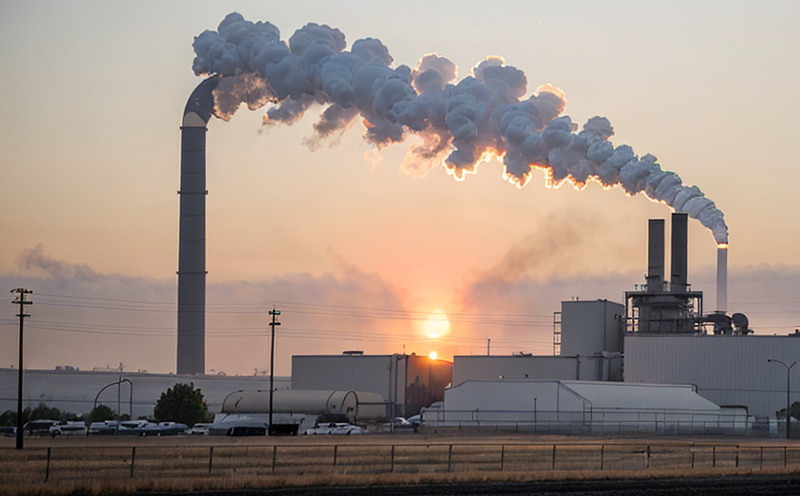ISO 15713 Sulfur Dioxide Testing in Processing Facilities
The ISO 15713 standard provides a comprehensive framework for sulfur dioxide (SO2) testing, which is crucial for ensuring compliance with environmental regulations and maintaining operational efficiency in industrial processing facilities. SO2 is a key component of air pollutants that can cause significant harm to both the environment and human health if not controlled properly. This service ensures accurate measurement and control of sulfur dioxide emissions.
In many industrial sectors, including chemical manufacturing, petroleum refining, and pulp & paper processing, SO2 is produced as a by-product of various processes. The presence of this gas can lead to acid rain, smog formation, and other environmental issues if not managed effectively. Therefore, regular testing and monitoring are essential.
The ISO 15713 standard offers a robust approach to measuring SO2. It specifies the procedures for sampling, handling, analyzing, and reporting of sulfur dioxide in gaseous form at ambient temperature conditions. This ensures that industrial facilities can accurately determine their emission levels and take necessary steps to meet regulatory requirements.
The testing process involves several critical steps:
- Sampling: SO2 is sampled from the stack or point of emission using appropriate sampling equipment.
- Transportation: The sample must be transported under controlled conditions to ensure it remains representative throughout transportation and analysis.
- Analysis: Various analytical methods may be used, including chemical titration, colorimetric methods, and gas chromatography.
- Reporting: Results are documented according to ISO 15713 standards for transparency and accuracy.
The primary goal of this service is not only compliance but also providing actionable insights that can improve operational efficiency. By identifying areas where SO2 levels exceed acceptable limits, facilities can implement corrective measures promptly. This proactive approach helps prevent potential environmental damage and reduces the risk of legal penalties.
In addition to regulatory compliance, accurate sulfur dioxide testing plays a vital role in maintaining industrial equipment integrity. High concentrations of SO2 can corrode metal components over time, leading to costly repairs or replacements. Regular monitoring allows for early detection of such issues, enabling timely interventions that save money and extend the lifespan of critical assets.
To ensure reliability, our laboratory adheres strictly to ISO 15713 guidelines throughout every stage of the testing process. Our team of experienced professionals uses state-of-the-art instruments calibrated according to international standards to deliver precise results. We also offer customized solutions tailored specifically to your facility's unique needs and regulatory requirements.
Our commitment to excellence extends beyond just meeting compliance targets; we strive to continuously improve our practices through ongoing research and development. By staying at the forefront of technological advancements, we ensure that you receive up-to-date information on best practices for minimizing SO2 emissions while optimizing production processes.
In summary, ISO 15713 sulfur dioxide testing is an indispensable tool for maintaining both environmental responsibility and operational efficiency in industrial processing facilities. By leveraging this service, businesses can safeguard their reputation, comply with legal obligations, protect natural resources, and enhance overall sustainability efforts.
Scope and Methodology
| Aspect | Description |
|---|---|
| Sampling Procedure | The procedure involves collecting air samples from the point of emission using specialized sampling devices. These devices must be suitable for capturing SO2 without interference or loss. |
| Sample Handling | Once collected, samples are transported to the laboratory under controlled conditions to maintain their integrity until analysis can begin. |
| Analytical Methods | We utilize multiple analytical techniques such as chemiluminescence, gas chromatography, and titration methods. Each method has its own advantages depending on specific application needs. |
| Reporting Standards | All results are reported according to the ISO 15713 standard ensuring consistency and comparability across different facilities. |
The scope of our testing extends beyond mere measurement; it encompasses a full lifecycle approach aimed at helping industrial processing facilities manage SO2 effectively. From initial sampling through final reporting, we provide comprehensive support to ensure accurate and reliable data.
In conclusion, adhering strictly to ISO 15713 ensures that our testing meets the highest quality standards. Our methodologies are designed not only to meet regulatory requirements but also to offer valuable insights into how your facility can reduce SO2 emissions sustainably.
Industry Applications
- Petrochemical refineries: Monitoring SO2 emissions helps in optimizing catalytic converters and reducing air pollution.
- Power plants: This testing is essential for coal-fired power stations to comply with emission limits set by regulatory bodies worldwide.
- Fertilizer manufacturing: Ensuring low SO2 levels prevents contamination of end products and protects worker health.
- Pulp & paper mills: These facilities produce significant amounts of SO2. Regular testing helps in maintaining compliance with local environmental laws.
The versatility of ISO 15713 sulfur dioxide testing makes it applicable across various industries. Whether your business falls under petrochemicals, power generation, chemical processing, or any other sector involving combustion processes, our expertise can help you achieve optimal performance and regulatory compliance.
Environmental and Sustainability Contributions
- Promotes cleaner air: By accurately measuring SO2, we contribute to reducing atmospheric pollution.
- Enhances worker safety: Lowering SO2 levels minimizes health risks associated with exposure to this toxic gas.
- Sustains natural resources: Effective management of SO2 emissions helps preserve ecosystems affected by acid rain and other harmful effects.
- Supports sustainable development goals: Our services align with global initiatives aimed at promoting environmental stewardship and responsible resource use.
Beyond these tangible benefits, ISO 15713 sulfur dioxide testing plays a pivotal role in fostering long-term sustainability within industrial processing facilities. It enables continuous improvement towards greener operations while contributing positively to broader societal goals.





